Hello everyone! welcome to my Japanese learning blog- where I share my journeying in studying Japanese! ☆I am built upon the small things I do every day, and the end results are no more than a byproduct of that.☆-Kita Shinsuke (ハイキュー) (She/Her)
Don't wanna be here? Send us removal request.
Text
間 (ma) “emptiness, space, interval”

I told Miyazaki I love the “gratuitous motion” in his films; instead of every movement being dictated by the story, sometimes people will just sit for a moment, or they will sigh, or look in a running stream, or do something extra, not to advance the story but only to give the sense of time and place and who they are.
“We have a word for that in Japanese,” he said. “It’s called ma. Emptiness. It’s there intentionally.”
Is that like the “pillow words” that separate phrases in Japanese poetry?
“I don’t think it’s like the pillow word.” He clapped his hands three or four times. “The time in between my clapping is ma. If you just have non-stop action with no breathing space at all, it’s just busyness, But if you take a moment, then the tension building in the film can grow into a wider dimension. If you just have constant tension at 80 degrees all the time you just get numb.”
Which helps explain why Miyazaki’s films are more absorbing and involving than the frantic cheerful action in a lot of American animation. I asked him to explain that a little more.
“The people who make the movies are scared of silence, so they want to paper and plaster it over,” he said. “They’re worried that the audience will get bored. They might go up and get some popcorn.
But just because it’s 80 percent intense all the time doesn’t mean the kids are going to bless you with their concentration. What really matters is the underlying emotions–that you never let go of those.
— Roger Ebert in conversation with Hiyao Miyazaki
200 notes
·
View notes
Text
In Japanese language, describing a third person’s emotion is different from describing a first person’s emotion: in English, the sentences "I am happy" and "He is happy" are grammatically structured in the same way. However, in Japanese, this direct equivalence is not possible: you can say "私は嬉しいです" (Watashi wa ureshii desu), but you can't simply say "彼は嬉しいです" (Kare wa ureshii desu).
This is due to cultural and linguistic nuances that emphasize the acknowledgment of another's internal state as somewhat inaccessible. In fact, Japanese typically employs expressions that convey a level of inference or indirectness, such as:
Using observational phrases: one might say 「彼は嬉しそうです」 (Kare wa ureshisō desu), which translates to "He seems happy" or "He/she looks happy." This phrasing respects the notion that one can only observe outward signs of emotion, not definitively know another's internal state.
Adding "ようだ" or "みたい": these suffixes add a sense of speculation. For example, 「彼は嬉しいようだ」 (Kare wa ureshii yō da) or 「彼は嬉しいみたいです」 (Kare wa ureshii mitai desu), both meaning "He appears to be happy."
Using conditional clauses: Another approach is to use conditional forms, like 「彼が嬉しければ」 (Kare ga ureshikereba), meaning "If he is happy," which implicitly acknowledges the uncertainty of truly knowing his feelings.
One characteristic of Japanese syntax is its extreme sensitivity to epistemological considerations based on the ego/nonego distinction or the distinction of I/the other. Our knowledge about the mental state of another person must necessarily come from our interpretation of external evidence, and this is well reflected in the Japanese language.
Source material: http://human.kanagawa-u.ac.jp/gakkai/publ/pdf/no157/15712.pdf
1K notes
·
View notes
Text
日記を書いています。
今日の歌:「Value」ーAdo (この歌は強くて優しいです!「残夢」は面白いアルバムです)
やーほう〜、ひさしぶり!!
ごめん、~ブログは更新しませんでした、新し
先週の月曜日は日記を書いていました、毎日日本語の日記を書ける時、文法と単語を磨苦と思います。話を考えますはちょっと難しい、でも多い話を思うことができます。毎日日記を書いたら、私は宿題の作文を手伝っていますから、漢字を覚えだし、怖くないし、いろいろ話は楽しいと思う、それにいい習慣です。
私は色々話にアニメキャラクターや家族のお出かけや日本語クラスの人生を書いています。
写真を見せています!

#japanese#language tag#日本語#japanese language#this is my first attempt writing it!!#Spotify#ado#language stuff
2 notes
·
View notes
Text
Yes, lately I have been have to do writing homework for my Japanese class, so I decided to do Lawrence of Arabia as my interesting name story, and I think I spent 3 drafts just working on the facts of Lawrence of Arabia and to make it a story.

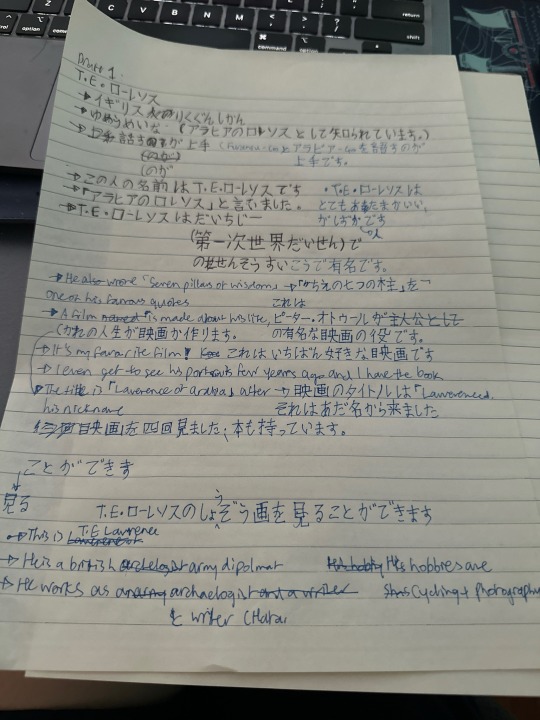
So it has been a while, so for my Japanese homework- I am working on telling someone about an interesting name and I thought of T.E Lawrence as my assignment, so my issue is to keep it very simple as I am not so fast in translating his life in Japanese, so I have to include the film 🤣🤣🤣
It requires a lot of brain work that I forget to do my kanji homework
6 notes
·
View notes
Text
Japanese Linguistic Observations in Spy x Family - part 2
Part 2 - Anya's "Anya-isms"
I think Anya has one of the most interesting ways of speaking out of all the SxF characters. But like with Twilight's dialogue that I previously discussed, it can only be fully appreciated in the Japanese version. Probably the most noticeable thing about her dialogue is how it's written compared to the other characters.
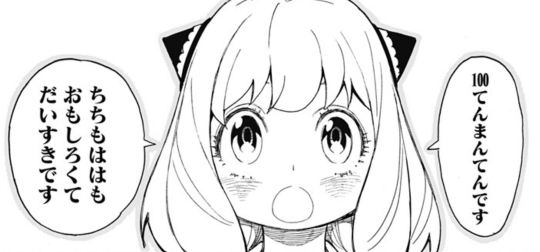
Written Japanese is comprised of three different alphabets: ひらがな (hiragana) and カタカナ (katakana), which together are referred to as "kana," and 漢字 (kanji). Kanji are the characters that hold the meaning of words, while kana simply represent the various Japanese syllable sounds and don't have any meaning on their own (much like the letters of the English alphabet). There are only about 100-ish total unique kana symbols, however, there are over 2,000 kanji in common use today. So Japanese children will start out learning kana and then learn kanji gradually during their school years. This is why Japanese children's books are typically written only or mostly in kana. This is also why manga and books aimed at a younger audience will have kana "translations" of kanji written above kanji characters, which are called furigana.
With that in mind, it's not surprising that all of Anya's dialogue in the Japanese version of the SxF manga is written entirely in kana. Even though using kanji in her dialogue wouldn't necessarily mean she knows kanji, reading a character's dialogue only in kana definitely gives off childish vibes – it conveys feelings of youthfulness and innocence, like "they're speaking only in kana because they don't know the kanji for these words…they're just a little kid, after all." At least, that's the feeling I get when I read Anya's dialogue. Though I haven't read enough manga in Japanese to say for sure, it seems like this concept of making little kids speak only in kana is not unusual, as there's at least one other example I know of: a manga from the mid-2000s called Yotsuba also has a titular 5-year old whose dialogue is written only in kana.
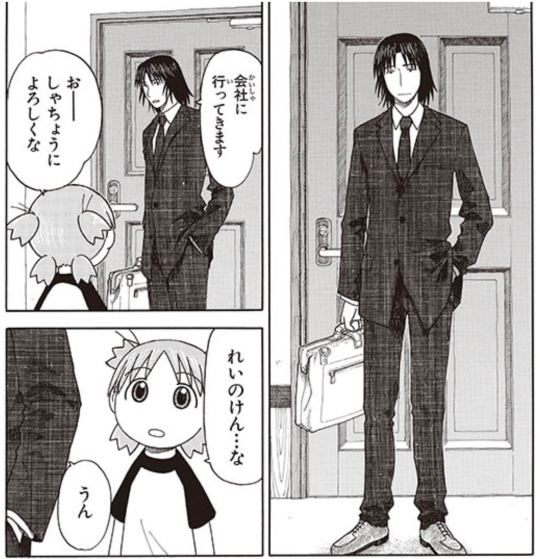
What's also interesting is that all of the other Eden kids speak "normally," using kana and kanji properly in their dialogue. This helps to convey the fact that, despite Anya being roughly the same age as them, their "rich family" upbringing has forced them to grow up faster. In the below panel, you can see how Damian's dialogue uses kanji (with furigana translations) while Anya's uses only kana, even for words that have kanji.
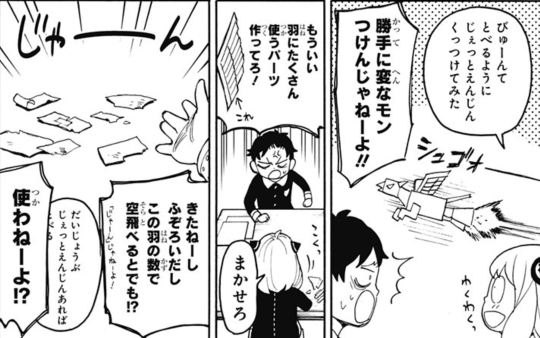
Interestingly, I found at least two cases where Anya does use kanji in her dialogue: when she's calling out the name of her big "Arrow of Light, Seize the Star" move during the dodgeball game, and when she calls out her "Lighting Bolt, Deliver my Aid" move when she tries to throw Yor's weapon back on the deck in the cruise arc. As you can see in the below panels, the names of these "moves" is written in kanji (with furigana translations). This makes sense not only because this is parodying shonen series where the characters shout out the names of their moves, but because it emphasizes how determined Anya was at these moments.
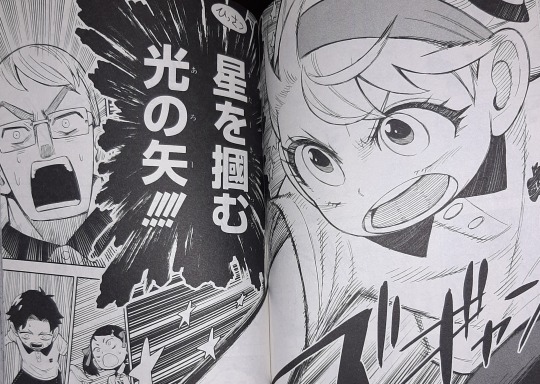
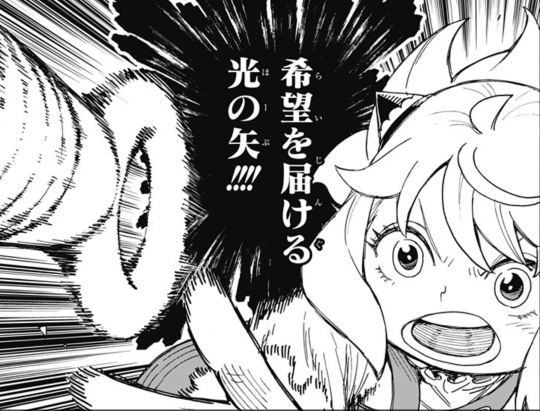
But going back to how Anya's speech compares to the other kids, another thing that stands out is that she speaks very "plainly." Her grammar is (mostly) correct, except for a few mistakes you'd expect a little kid to make. But she uses pretty much no colloquialisms, almost as if she knows the language but lacks the experience for using it in normal social interactions. I don't think this is unusual for a kid her age who's still learning, but it definitely stands out when compared to her classmates. For example, in the below panel, Becky uses normal interjections and other colloquialisms in her speech, like "ne" (ね), "wa" (わ), and "yo" (よ), which are all standard Japanese linguistic devices for softening or emphasizing your sentences. However, Anya doesn't use things like this in her speech. Again, this makes her speech come off as very plain and abrupt, almost like she's not a native speaker.
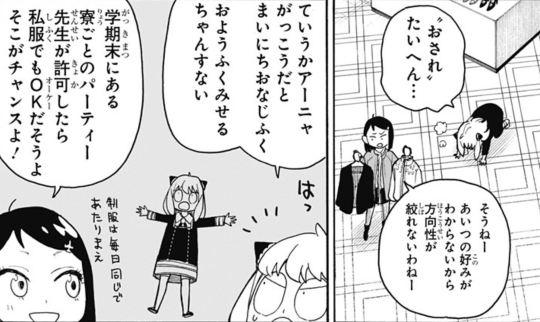
She also refers to herself in third person all the time in the Japanese version. In fact, I don't recall her ever using an "I" or "me" pronoun. I don't know why the English version of the manga doesn't keep this characteristic of her speech. I think it's very important in highlighting the childish aspect of her personality.
Putting all this together – the fact that she doesn't use typical colloquial speech and refers to herself in third person – really emphasizes the childish, naive, and almost baby-like nature of her character. I'm curious if Endo made her speak this way simply to show what a little kid she is compared to her classmates, or if it will somehow tie back to whatever roots she has in classical languages that he keeps hinting at. Regardless, as I mentioned in my full Anya analysis, what she lacks in speech and school smarts, she makes up for in empathy and resourcefulness.
Besides all this, Anya does make typical speech mistakes a normal kid would make, like mishearing words or saying things wrong. She mostly uses casual speech, but does try to use keigo (polite speech) on occasion, though not always correctly. For example, she says "ohayaimasu" (おはやいます) for "good morning" instead of "ohaiyou gozaimasu" (おはようございます).
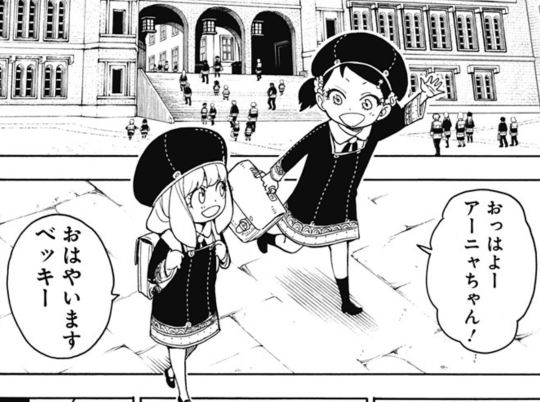
But the most consistent "mistake" she makes (though it's not really a mistake) is what she calls Loid and Yor – "chichi" (ちち) and "haha" (はは) respectively.
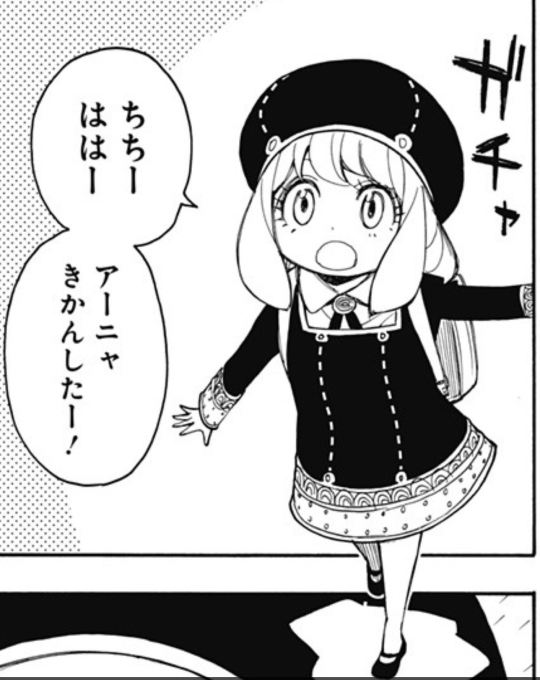
Japanese has many different words for relatives depending on whether you're talking about your own relatives or someone else's, and whether you're talking to them or about them. "Chichi" and "haha" are the general, neutral terms for "father" and "mother," and are also used when talking about your parents to someone else. However, they're not used when talking directly to your mother and father. There are many other words for that, the usual ones being "o-tou-san" (お父さん) and "o-kaa-san" (お母さん), or some variations of these with different honorifics. Damian refers to his dad as "chichi-ue" (父上) which is very formal, while Becky calls her dad the actual English word "papa" (パパ) which is very informal and normal for kids to use. But again, "chichi" and "haha" are typically only used when talking about your parents, not to them the way Anya uses them. This started from the very first chapter where Loid asks her to call him something that sounds "elite." He originally suggests the very formal "o-tou-sama" (お父さま), but when Anya says "chichi," he doesn't bother to correct her.
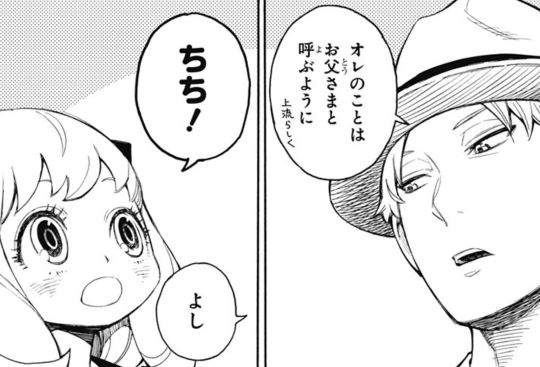
Hearing a little kid call her dad and mom "chichi" and "haha" is kind of like calling them "my father" and "my mother" even when speaking to them directly – it's not wrong necessarily, just strange. But again, this serves to further emphasize the childlike nature of Anya's character.
<- Return to Part 1
699 notes
·
View notes
Text
Take it Easy (気楽に行こう)
youtube
This one is slightly different, previously when I talk about my Japanese class- I was pretty much in a doubtful moment. I always joke that I was in my ballboy era, but this line of 'Take it easy" came to me. (Hence I plonk that encouragement here)
Like it took me forever, but I have found my 'Take it easy', and it start because I decide to switch my class to a different time (Intially it was due to a bout of exhaustion but slowly realize I like the vibes of that class), and all begins was 先生 deciding to play a card on us remembering the Te-form, which I was partnered with one of my classmates J, and she was so patient and kind along with her friend C, they offer me cookies and laughter which I feel for the first time, I can enjoy that, I an not putting myself in that expectation that I would succeed well and in addition, I figure how to do that.
Make no expections, I did try to make friends with the group I have on Saturday, because that group is much smaller, I feel that I have one to one attention with my teacher and at the same time I do not feel so rushed <3
Concidently, my class is Daichi {台地} (Previously my class name is Heigen) which happens to be the name of the Karasuno's captain Daichi, which also means Plateau, so it feels like meant to be I suppose, because I need to find that foundation to explore

Today, I get to meet another classmate and she is great too, as she brought her stuffie which makes me tempted to bring my Kita mochi to my class next week.

So these days, it is homework and self-studying through reading :'D, (I am challenging myself to read a Japanese folktale), though it is challenging I took it by stride
it is a lot of hard work-no joke, but I am glad I did it, as I held Kita's words in my hear "I do the small things every day", which is constantly my North star I suppose.
2 notes
·
View notes
Text
お久しぶりです。。。

Well I am supposed to be updating this blog, first of all, let me get out of the New Year greetings with this: 明けましておめでとうございます!
I apologize if I did not update it as much as I could, I wanted to talk about realization and truth of learning. First of all, I am a slacker in my own thoughts, I have desired to try physical classes since I feel that I am stuck doing so much self-learning 🥺, so I was toying with which classes would suit me (I actually took an actual class many years back before I enter university and this said teacher killed my motivation), so I decided to bite the bullet here and try this school because I was hoping to go for their weekday day classes (The cool thing is that the building feels like a James Bond film), so before Christmas weekend- I decide to go for a placement test to see where am I.
Sooo I, being overly confident be like yeah all my Japanese customers and associates said I can speak Japanese well (Do not be deceived by the comment 上手です) and I got this, which I got humbled pretty quick. Like really, which I have to nurse my ego that I am yes, I am willing and the tester be like uhm girl- you need to go basic which I am like yeah, and we decide to try you on that trial class before Christmas, and man it was a humbling experience because the changes are sudden and here am I, wanting to make friends and perhaps partnered with the worse person to bounce off in your speech (Well I do not have friends, so, unfortunately, I was partnered with that lady who could barely speak English with me), and I was nearly in tears, with me being unable to cope with the pacing that I was doubting myself if I could do, because some are so good and I, who self-taught myself for 3 years plus- become awkward and actually struggle.

So yes I was humbled again-big time, so I found myself alone and if not a little upset about my progress- then I decided to chat with an online friend, and she shared about how lonely her experience in learning Japanese and understood the struggle, and that moment I recall a panel in Haikyuu which Akaashi got over his head during one volleyball match and saying how jealous they are seeing the game- which I could relate- I feel like an anxious mess. However I decide to look at Kita's backstory and this came to me, which I am like Kita holding his captain jersey in my head going "Does this count on the result side of things?" , like I began to question myself- and this made me realize that I am so focused on the results that I forget to work on the present.
So cue me last Saturday, entering my first class- this time chatting with a friend to share my anxiety and I told myself about that experience which an epiphany came to me, that I held myself with high standards that it sucked the joy of me actually learning, which I can say that my 先生 be like are you alright, as she caught me packing my bag slowly after class, and I was like I struggle with particles in the Japanese language, that she took the time to write down the particles which I show her the document which I work. And what she said to me, is to slow down which I did not realize that I was simply hurrying because of my anxiety to be the best, which I could be myself (This is something which I am trying to undo but it is too ingrained in my brain), to just have fun. I am so concerned about the process that I forget to be in the present, just like Kita himself, to enjoy what I am doing. (She sorta reminds me of Takeda-sensei, the head teacher for the Karasuno team, and I am like Hinata per say).
But yeah, I am still a work in progress, letting go of the people-pleasing aspect and just being myself- I even got a better partner to bounce off of my conversation, though he is struggling as much as I am (minus the awkwardness).
Here is to new things to come and hopefully, I can be truly myself
4 notes
·
View notes
Text
始め (An introduction to this blog)
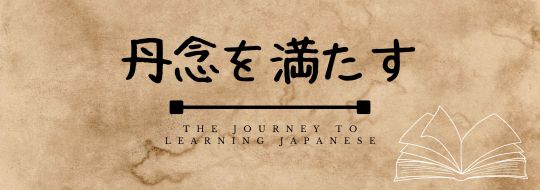
こんにちはキャサリンです!!はじめまして!!
シンガポールです!!私は勉強日本語四年.
So now we come to the English part (I am very slow at typing on my Macbook - I really need to really work on it.) I am thinking of sharing my journey on getting better in Japanese- so in case why I named this handle in particular, so this is inspired by the special exhibition art from the anime Haikyuu which has a kanji to associate with the volleyball player’s style (Like seriously please guys watch Haikyuu as it is so inspiring)- so two of the characters which I loved- Kita and Osamu, which I will give the kanji of it
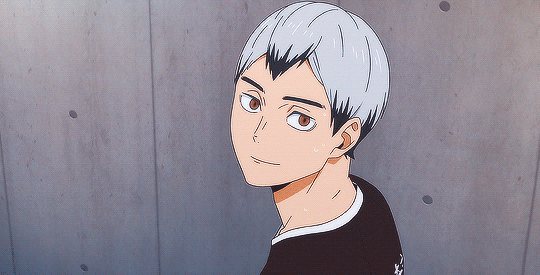
北〜さん: 丹念 (tan'nen):Meticulous, careful, detailed, with great care (Fitting because his quote -'I am built upon the small things I do every day, and the end results are no more than a byproduct of that.' is my guiding light both personally and in my language journey)
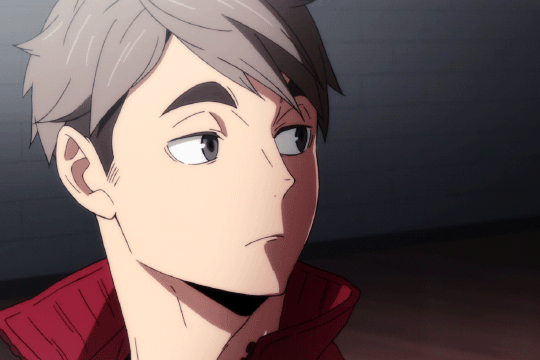
治〜さん:満たす (Mitasu) : To be full, to be satisfied; (I have a very very soft spot for Miya Osamu which I will talk about another time, but his philosophy of searching for something that is fulfilling always resonates with me, but he also adds that hunger is key to finding new things)
So this blog title I called it: 丹念を満たす, meaning to satisfy with great care I feel is the journey which I went through the highs and lows, and perhaps I can track my progress in actually excelling in Japanese
Hence my journey is simply starting per se 😅, I am not perfect in all means and I really really hope I will get better even if it is one small step.
So I hope you enjoy me rambling about my challenges and triumphs here.
どうぞうよろしくお願いします!!
4 notes
·
View notes
